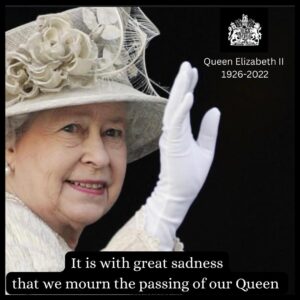This tribute to Queen Elizabeth II was written by Carrie Lloyd, friend and supporter of Healing Rooms England & Wales.

We do not mourn another monarch but a quality far superior.
Something beyond the titles of Head of State, State Governor of the Church of England, Queen Regina, Lady Sovereign, Order of the Garter, Defender of the Faith – Her Royal Highness, Queen Elizabeth II.
We mourn the character that carried the crown – as heavy and uncomfortable as it was.
This churned grief that robs us of breath and balance, expresses itself through abundant tributes:
The Sydney Opera House, the same building she opened in 1973, illuminated her picture on its sails. The Eiffel Tower turned off its midnight lights as we turned off our smiles. In Berlin, The Brandenburg Gate makes itself a canvas for a projected Union Jack – the same country we were once at war with. The deafening sounds of the ninety-six gun salutes ricocheted in major cities across the commonwealth. And the Grenadian soldiers need not pretend to sob or wail, (a regular training exercise to prepare their horses through national outcry) because, this time, the tears are real.
Confessions of Presidents, Monarchs, Activists and the Military repeat in unison, “this was our favorite Queen”. The same confessions come forward from my friends of all ethnicities thanking her for changing the narrative of the past – releasing countries from Ghana to Mauritius, Kenya to Bahrain, Gambia to South Yemen, back to its people. Disintegrating slowly a once colonizing and racial narrative that, she especially, found gut wrenchingly repugnant.
Currently, you can not see England’s green and pleasant land on foot in London, for it is cloaked with a carpet of Lily of the Valley, Union Jacks and Paddington Bears. A sea of black suits flood Westminster Palace; never before have we seen members of parliament lower their heads for longer than one minute…
…until now.
The difference between the politician and monarch could be surmised by a story in an era when papers were printed three times a day, and the wire held limited information. The crowds once lined Pall Mall seeking for their familiar voice, for that gumptive strength amid the opening threats of the First World War. The Prime Minister looked at the people as he drove into Buckingham Palace asking, “Why are none of them at work?!” But when the King looked outside his home to the solemn and fearful faces, he whispered to his God: ‘My poor people.’
One holds policy and opinion, the other, if they’re doing their job right, prioritizes peace, and compassion.
And herein lies the irony; as we roam Pall Mall again, searching for the singular comfort we all turned to through the wars come Gulf or Falklands, The Cold and Korean; the pandemic, the strikes, the crises bred by unemployment or terrorism; our voice of comfort – is dead.
Grief stricken fear marinates us as the ink of that code word begins to dry. The phrase muttered through the phone lines to the cabinet, the military and heads of state, the words we forever dreaded: ‘London Bridge is Down’.
We are no different to a sick kid, desperate to be held by their mother, a matriarch, to console us – no teacher, no nurse will do. For we grieve the reminder of Hope, the contender for freedom and unity. After all, she’s been pouring vision into us since she was 14, since her first broadcast to the orphaned children of the Second World War:
“It will be up to us,” she told them, “the children of today, to make the world of tomorrow a better and happier place.”
Still, children we are. For hers was the same voice we shook our fists at, shouting cruel slurs when, she too, grieved the sudden death of that all-too-necessary-daughter-in-law, furious that she wasn’t coming to our aid quick enough. We threw tantrums against her tiaras when our frugality refused to restore her favorite home during 1992, the year of the Windsor fire and broken marriages – that “Annus Horribilius”. Another cliched reminder, that it’s lonely on the throne. Yet this did not permeate that undiminished spirit of stability. Even when we forgot that, she too, bled.
Amid the cries of mourning mothers losing their children in the Dunblane disaster, the Aberfan Landslide, the Grenfell Tower fire, she always fled to the scene, leaving her Traviata handbag outside a wailing room, entering privately for no other audience but them. Holding their groans and fury in a loss no person can fathom. Mick Jagger marked it beautifully when he shared ‘She was always there, she is all I’ve ever known.’
She ensured, however, that her own tears remained behind vestibules and black veils. Her country didn’t need more bitterness or drama, more cutting slurs or labels, more opinions or jibes – for duty called.
Duty. Always. Called.
A posture that robbed her from her own indulgences and pleasures at 25. No apprenticeship, no time to prepare. In some way, our Elizabeth had died already to Queen Regina, in 1952.
So let it be known, to a world hungry for fame and influence, impact and power – that the one who held the highest rank in the land, was the one to stoop the lowest. A concept lost in the cantankerous woke of our youth. No wonder we are frightened. No wonder lines reach far beyond Tower Bridge. No wonder our tears do not dry.
Such stability in a Monarch, such longevity in reign, requires serious sacrifice – serious nobility. A moral excellence that, although previous monarchs have unquestionably used their position to condone prejudice – titillating power like a game of Cat and mouse, it takes a true Queen with tenacious character, to be a humble servant.
This humility kept teaching us repeatedly by witnessing her own personal hurdles, that forgiveness is the path to peace, to freedom: The wreath she laid at the memorial of the people who murdered her husband’s uncle. That honoring bow that forced us to rub our eyes, as Lady Diana’s body passed the Queen, for one last time. The engaged smiles to those who wanted her there, when others outside bashed on the doors, cussing at her to leave. No palace, no sapphire will build your resilience. Such courage is found in something else. A faith that instigated those long talks with Billy Graham, on forgiveness, another act of duty that must ensue both on personal and global scales.
Unfashionable in her poise and demeanor, voiceless to some, but potently brilliant in private, it was Winston Churchill, whom noted her qualities of character, before the rest of the world would catch it.
“She is a character.” He wrote to his wife from Balmoral. “She has an air of authority and reflectiveness, astonishing in an infant.”
How remarkable it seems now, that such qualities were recorded by England’s greatest war leader, towards England’s finest Queen.
Those qualities were noted of Elizabeth in 1928.
When Lilibet, was two.
But it still required her personal ‘yes’ to build this character. It’s what made her be the Monarch of many firsts: The first royal female to sign up for the armed forces – the first in a thousand years. The first to alter marital rules – for without her, there would be no William and Kate, no Harry and Meghan, no Queen Consort for the new King. The first to send an email, in 1976. The first to jump out of a helicopter, never mind the first to sky jump with James Bond – the first to make us laugh, the first now in death, to make us cry.
And if the Prince’s Trust alone raised one million pounds a week, with the royal family establishing patronages of over a thousand charities between them, this dynasty is the first to raise billions for philanthropy – more charity aid from one family than the world has ever seen.
And let us not forget, she was the first monarch, after 92 years of life, to finally answer that question we were forever discussing at home; what does she carry in that handbag of hers, to carry it around so much at home?
No wonder the Horse Guards are tripping over Marmalade Sandwiches, as they stride the pavements of Hyde Park.
Ignore the critics who frown upon the pomp and ceremony. For it is the gold-lined red velvet, the Orb and the jewel, the cipher and the stagecoach, the leather blinkered eyes of the Shire and Stallion, the beat of the steel-capped boots of the coffin-bearers, haunting visuals that bring us beauty, when the world lacks of it. Grief needs the healing tonic of beauty; like water, like trees, we seek it to cleanse ourselves of bitter witness and draconian glares.
It is within these paradoxes in which we walk The Mall. The splendor and the surreal. The familiar and the unknown. The giant soldier next to the curtseying civilian. The sparkling life of the Imperial State crown resting over the cold leaden lining of her coffin. 2.1 billion lives, looking at the end of just onelife.
Like all good mothers, they think ahead for their children’s children’s future. A future filled with that “better and happier tomorrow”. This entire time, since 1948, the Queen has been preparing for this moment. Raising a son to take care of us, to keep calm, to carry us on.
She was the nation’s song, the anthem, the rock. We must reach now to the entity she looked to, when the teacher, and the nurse, would not do.
That same essence that put the ‘great’ in Elizabeth, the ‘humble’ in servant, the ‘brave’ in the two-year-old Lilbet, was her same strength that put the wreath at the killer’s grave, the splendor in the surreal, the comfort in death’s dust.
I pray that we are human,
I pray that we don’t forget,
the power of which she taught us:
great character must be kept.
Let this haunting beauty
cleanse us from code, to tribute, and drum.
She’s written a letter to all of us
By way of a trained and gifted son.
Never before will we be here again:
The longest reigning monarch in the land,
one who bought some stability – with the commonwealth in her hand.
Look over us your Majesty,
Learn once more across our sorrow.
That in a world filled with tricks and drudgery – sweet Lilibet….
You made a better tomorrow.
